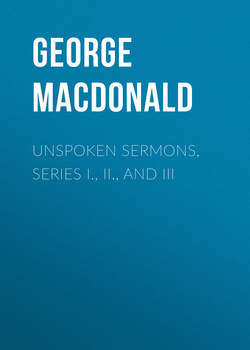Читать книгу Unspoken Sermons, Series I., II., and III - George MacDonald - Страница 12
UNSPOKEN SERMONS FIRST SERIES
LOVE THINE ENEMY
ОглавлениеYe have heard that it hath been said, Thou shalt love thy neighbour, and hate thine enemy; but I say unto you, Love your enemies, bless them that curse you, do good to them that hate you, and pray for them which despitefully use you, and persecute you; that ye may be the children of your Father which is in heaven; for he maketh his sun to rise on the evil and on the good, and sendeth rain on the just and on the unjust. For if ye love them which love you, what reward have ye? do not even the publicans the same? And if ye salute your brethren only, what do ye more than others? do not even the publicans so? Be ye therefore perfect, even as your Father which is in heaven is perfect.—St Matthew v. 43-48.
Is not this at length too much to expect? Will a man ever love his enemies? He may come to do good to them that hate him; but when will he pray for them that despitefully use him and persecute him? When? When he is the child of his Father in heaven. Then shall he love his neighbour as himself, even if that neighbour be his enemy. In the passage in Leviticus (xix. 18,) already referred to as quoted by our Lord and his apostles, we find the neighbour and the enemy are one. "Thou shalt not avenge, nor bear any grudge against the children of thy people, but thou shalt love thy neighbour as thyself: I am the Lord."
Look at the glorious way in which Jesus interprets the scripture that went before him. "I am the Lord,"—"That ye may be perfect, as your Father in heaven is perfect."
Is it then reasonable to love our enemies? God does; therefore it must be the highest reason. But is it reasonable to expect that man should become capable of doing so? Yes; on one ground: that the divine energy is at work in man, to render at length man's doing divine as his nature is. For this our Lord prayed when he said: "That they all may be one, as thou, Father, art in me, and I in thee, that they also may be one in us." Nothing could be less likely to human judgment: our Lord knows that one day it will come.
Why should we love our enemies? The deepest reason for this we cannot put in words, for it lies in the absolute reality of their being, where our enemies are of one nature with us, even of the divine nature. Into this we cannot see, save as into a dark abyss. But we can adumbrate something of the form of this deepest reason, if we let the thoughts of our heart move upon the face of the dim profound.
"Are our enemies men like ourselves?" let me begin by asking. "Yes." "Upon what ground? The ground of their enmity? The ground of the wrong they do us?" "No." "In virtue of cruelty, heartlessness, injustice, disrespect, misrepresentation?" "Certainly not. Humanum est errare is a truism; but it possesses, like most truisms, a latent germ of worthy truth. The very word errare is a sign that there is a way so truly the human that, for a man to leave it, is to wander. If it be human to wander, yet the wandering is not humanity. The very words humane and humanity denote some shadow of that loving-kindness which, when perfected after the divine fashion, shall include even our enemies. We do not call the offering of human sacrifices, the torturing of captives, cannibalism—humanity. Not because they do such deeds are they men. Their humanity must be deeper than those. It is in virtue of the divine essence which is in them, that pure essential humanity, that we call our enemies men and women. It is this humanity that we are to love—a something, I say, deeper altogether than and independent of the region of hate. It is the humanity that originates the claim of neighbourhead; the neighbourhood only determines the occasion of its exercise." "Is this humanity in every one of our enemies?" "Else there were nothing to love." "Is it there in very deed?—Then we must love it, come between us and it what may."
But how can we love a man or a woman who is cruel and unjust to us?– who sears with contempt, or cuts off with wrong every tendril we would put forth to embrace?—who is mean, unlovely, carping, uncertain, self-righteous, self-seeking, and self-admiring?—who can even sneer, the most inhuman of human faults, far worse in its essence than mere murder?
These things cannot be loved. The best man hates them most; the worst man cannot love them. But are these the man? Does a woman bear that form in virtue of these? Lies there not within the man and the woman a divine element of brotherhood, of sisterhood, a something lovely and lovable,—slowly fading, it may be,—dying away under the fierce heat of vile passions, or the yet more fearful cold of sepulchral selfishness—but there? Shall that divine something, which, once awakened to be its own holy self in the man, will loathe these unlovely things tenfold more than we loathe them now—shall this divine thing have no recognition from us? It is the very presence of this fading humanity that makes it possible for us to hate. If it were an animal only, and not a man or a woman that did us hurt, we should not hate: we should only kill. We hate the man just because we are prevented from loving him. We push over the verge of the creation—we damn
